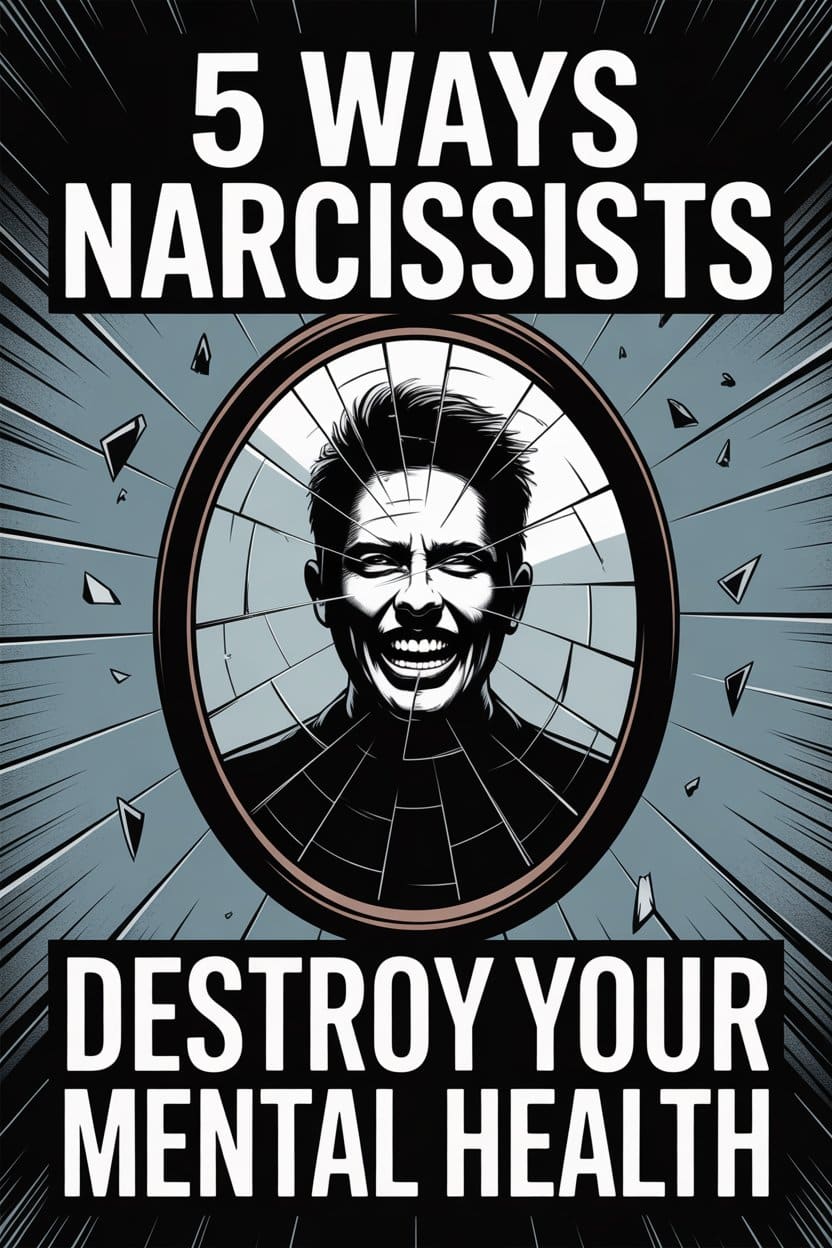It starts as a whirlwind: the charm, the grand gestures, the feeling that you’ve finally met someone who sees you. Then, somewhere between being love-bombed and wondering if you’re losing your marbles, reality hits.
Sharing your life with a narcissist is like handing your brain—and heart—to someone who thinks emotional demolition is a competitive sport.
Curious about how they manage to turn your inner world upside down? Let’s pull back the velvet curtain.
1. Gaslighting Until You Doubt Your Own Name
If you haven’t heard of gaslighting, you’re either blessed or living under a rock carved by narcissists themselves. This mind-bending tactic leaves you second-guessing everything from your memory to your sanity.
Conversations twist and turn until reality feels like a choose-your-own-adventure book where every ending is “You’re Wrong.”
Narcissists are Olympic-level practitioners at rewriting events. That time you caught them lying? Suddenly, you’re “paranoid” and “too sensitive.”
Last week’s screaming match? No, darling, that never happened—are you feeling alright?
Bit by bit, the ground beneath your feet crumbles. You question your memory, your judgment, even your grip on reality.
Friends and family start to notice you losing confidence, and it’s not just because you’ve forgotten where you left your keys again.
Counter this by keeping a written record of events and conversations. (Yes, you’ll feel like a detective in your own drama, but sanity is worth a little note-taking.)
When things don’t add up, trust the version of events you’ve documented, not the remix coming from your partner.
2. Isolation Wrapped in “I Love You”
Narcissists don’t just want to be the center of attention; they want to be the entire solar system. What better way to achieve this than by shrinking your world until they’re the only star left?
The process starts innocently enough: “Your friends don’t understand you like I do.” “Your family is so negative.”
Cue the slow fade of your social life, as invitations are turned down, texts go unanswered, and you become more and more dependent on the one person who’s actually undermining you.
Isolation isn’t about love. It’s about control. Humans need support systems—friends who remind us we’re funny, family who tell us when we’re being a doofus, colleagues who help us keep perspective.
Once a narcissist has trimmed your social circle to a lonely dot, you’re left with no one to reality-check their narrative.
Kick back against this by nurturing your connections, even if it’s just a coffee with a mate or a text chain with your cousin. If your partner objects, take it as the neon warning sign it is.
Keep your lifelines strong, because even narcissistic gravity can’t trap you when you’ve got people pulling you back.
3. Emotional Roller Coasters That Never Seem to Stop
Peace and predictability are as foreign to a narcissist as humility and self-reflection. Their specialty? Swinging between affection and cruelty fast enough to give you whiplash.
One minute, you’re prince or princess of their wild, passionate kingdom. The next, you’re the villain in a story you never volunteered for.
This hot-cold routine keeps your nervous system running like a hamster hopped up on espresso. Over time, the uncertainty erodes your sense of safety and stability.
You learn to walk on eggshells, always anticipating the next mood swing or snide comment.
It’s not just exhausting—it’s insidious. Research shows that intermittent reinforcement (the old “sometimes I’m nice, sometimes I’m not” trick) is more addictive than reliable cruelty.
You might find yourself chasing their approval, desperate for those rare moments of kindness.
Step back and pay attention to the pattern, not the promises. If love feels more like a game of emotional musical chairs, it’s not just you.
Reclaim a little calm by setting boundaries about what you will and won’t accept, and—hard as it is—stick to them.
4. Weaponized Criticism That Chips Away at Self-Worth
Every relationship comes with the occasional argument or honest critique. Narcissists, though, wield criticism with the casual glee of a toddler with a marker and a freshly painted wall.
Their put-downs are never constructive. Instead, you’re too sensitive, too needy, not attractive enough, not successful enough, not enough—period. Over time, these jabs accumulate until your self-esteem looks like Swiss cheese.
Compliments? Those are rationed out just enough to keep you hooked, like the world’s least satisfying reward system. The rest of the time, you’re bombarded with subtle digs, backhanded compliments, and outright insults.
Here’s where you get to play “Whose Opinion Matters Most?” Spoiler: it should be yours. Practice self-kindness and remind yourself of your strengths, preferably out loud and in front of the bathroom mirror.
If you notice their voice in your head when you’re beating yourself up, call it out. Better yet, imagine telling them off in your head—bonus points if it involves a dramatic monologue.
5. Turning Your Empathy Into Emotional Roadkill
Empathy is your superpower—unless a narcissist gets their hands on it.
These folks are experts at milking your compassion for all it’s worth, turning every confrontation into a sob story about their childhood, their boss, or why the world just doesn’t understand them.
Chances are, you’ve found yourself apologizing for things that aren’t your fault, bending over backwards to keep the peace, or walking away from arguments feeling guilty for having needs at all.
With every emotional sleight-of-hand, your empathy gets weaponized against you.
It’s exhausting, not to mention unfair. There’s a difference between supporting a partner and becoming their emotional doormat.
Healthy relationships require two people willing to meet each other halfway—not one person running a one-man sympathy marathon.
Try a simple reset: When guilt starts bubbling up, ask yourself, “Is this actually my responsibility?” It’s not selfish to have boundaries or expect respect.
Compassion is a finite resource; protect yours like it’s the last Tim Tam in the packet.
Reclaiming Your Sanity From a Narcissist
Life with a narcissist can feel like living inside a hall of mirrors—warped reflections, endless confusion, and echoes of criticism that seem impossible to escape.
The good news? Those mirrors can be smashed (metaphorically, please—no need for actual property damage).
Rebuilding your mental health starts with recognizing their tactics for what they are: manipulations, not truths.
Keep your support system close, document what happens, set boundaries, and refuse to let someone else’s opinion become your internal soundtrack.
It’s not disloyal to stand up for yourself. In fact, reclaiming your peace might just be the bravest, kindest thing you ever do.
Your mental health deserves star billing in the story of your life—no narcissist required.


